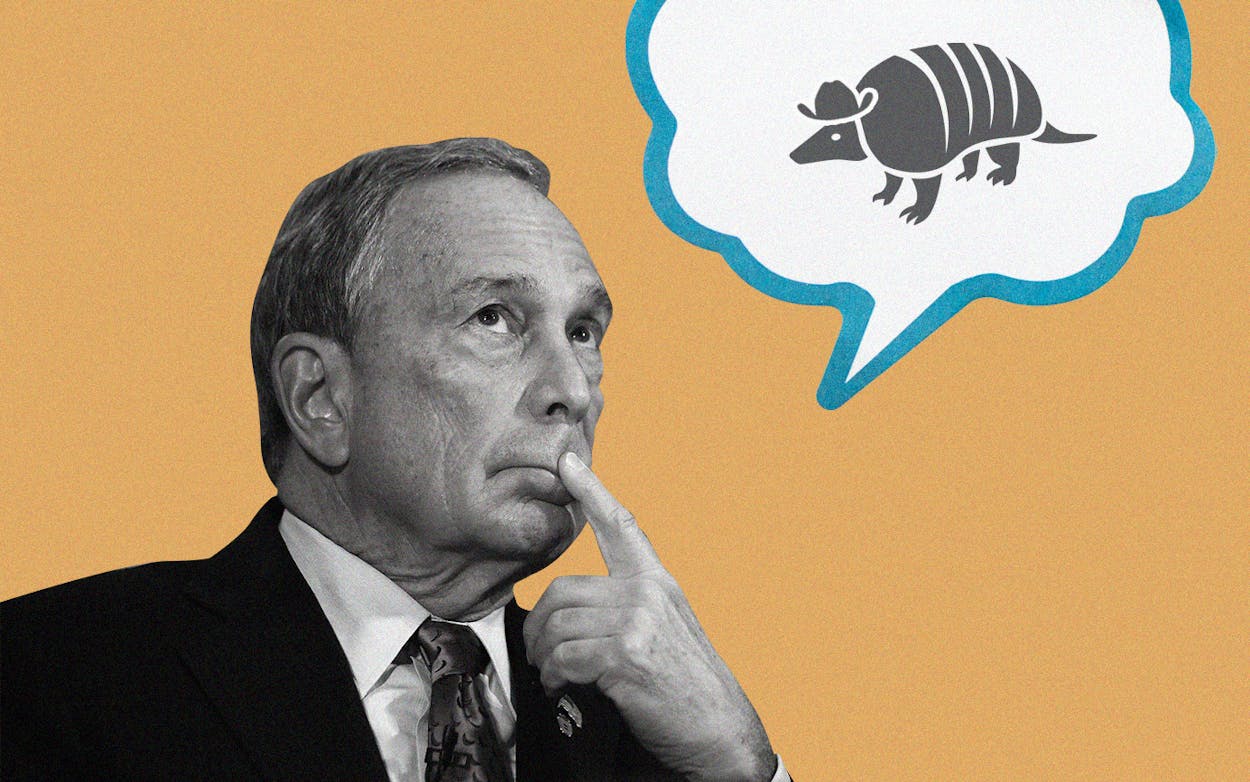I have low confidence about the quality of a debate moderated by MSDNC, and especially by Chuck "Brownshirt" Todd. This piece in VanFair from Tom Kludt aggregates and explains quite well the conflicts between the network's hosts and the Sanders campaign and their supporters. So much there worth absorbing, so the snips below summarize the best analysis.
So if there is lots of moaning and wailing and rending of garments about socialism, and invitations to assault the front-runner and not the oligarch, we'll have a better understanding about whether The Place for Politics is working on being an honest broker or not. Not holding my breath.
-- Gonna swing by Bloomberg's HQ today for lunch. And then dinner tonight. And maybe a few more meals between now and March 3.
Damn, now I'm hungry.
-- Amy Klobuchar pulled a Mexican out of her grade school history at the Las Vegas Culinary Workers Union hall last night.
Best response:
(I'll have a postlater today tomorrow about last night's #TXSen debate. It was fun.)
-- Not sure if Warren managed any better.
Maybe Barack "Grab a Mop" Obama will have something to say about that, but I doubt it. Dude's busy interviewing gardeners to tend to his legacy.
Entering Wednesday’s debate in Las Vegas, which will be co-hosted by MSNBC and NBC News, the ongoing tension between the titular liberal cable news network and the current Democratic front-runner has only intensified, and appears symptomatic of generational and ideological rifts within the party. It is at once a test of both MSNBC’s influence over the process and Sanders’s ability to withstand establishment resistance.
[...]
MSNBC’s coverage is also a microcosm of the generational split that Sanders faces in the primary. While Sanders cleans up among young Democratic voters, the 78-year-old fares poorly among his own age cohort (which also more closely mirrors the cable news audience). Voters aged 65 and older were shaped by the Cold War, leaving many wary of the ”socialist” label that Sanders embraces, and they were scarred by McGovern’s landslide defeat in 1972. They are more contemporaries and ideological peers of Matthews, and theirs -- not Sanders’s -- is the predominant point of view heard among MSNBC’s center-left pundits.
[...]
That Sanders has emerged from the first two contests with the clearest path to the nomination is perhaps a sign that the network’s influence over Democratic politics has waned, a reality check similar to Fox’s realization that its own power over the GOP had been eclipsed by Trump. “That’s the question that will be answered in the coming months: how much power do they have?” (The Intercept's Ryan) Grim said. ”Liberals and conservatives have different relationships to the media. MSNBC is in a better position to drive the progressive conversation because liberals have such trust in the fourth estate, and it’s a trust that has only increased amid Donald Trump’s assault on it.”
So if there is lots of moaning and wailing and rending of garments about socialism, and invitations to assault the front-runner and not the oligarch, we'll have a better understanding about whether The Place for Politics is working on being an honest broker or not. Not holding my breath.
-- Gonna swing by Bloomberg's HQ today for lunch. And then dinner tonight. And maybe a few more meals between now and March 3.
Pete Buttigieg may hold fundraisers in a wine cave, but Bloomberg brings wine to the voters, serving it alongside Cuban sandwiches and kosher pigs in a blanket at a Miami rally in late January. Two weeks ago, in Philadelphia, more than 1,000 attendees feasted on hoagies, honeyed Brie, and cheesesteaks at Bloomberg’s expense.
In 1948, Congress passed a law banning the use of expenditures to influence voting, virtually ending the practice of candidates handing out free food and drinks to sway voters. The law applies only to inducements to vote a particular way, however; doling out goods freely, without the promise of a particular vote, is perfectly legal -- as made clear by Tom Steyer’s taco truck at an early-voting site in Las Vegas. “If you get the food regardless of whether you take it and walk down the street and vote, it’s not a quid pro quo,” (Loyola Marymount University and election law expert Justin) Levitt says. “Shady is in the eye of the beholder.”
[...]
At a recent “Brazilians for Bloomberg” event at Beco in Williamsburg, Brooklyn, there were plates of empanadas, steak sandwiches, and pao de queijo (cheesy bread), while pitchers of caipirinhas were continually refreshed, in both passionfruit and regular flavors. (Last night), at a “Vietnamese-American Campaign Allies” event at the hit Lower East Side eatery An Choi, happy-hour specials on Saigon beer, taro fries, spring rolls, and Vietnamese wings will be covered by the campaign. “I’m getting a firsthand experience in how the Bloomberg machine works,” said An Choi owner Tuan Bui, who added, “I’m voting for Bernie Sanders.”
Damn, now I'm hungry.
-- Amy Klobuchar pulled a Mexican out of her grade school history at the Las Vegas Culinary Workers Union hall last night.
omg its real. it's 100% real!!!! https://t.co/CZFeCUOWq1 pic.twitter.com/2pwXoXdi40— Brett Banditelli 🚫✂️ (@banditelli) February 19, 2020
Best response:
Did she change her last name to Tzintzún?! 🤣😂 Lawrdee! The pandering y’all!😂🤣— OpheliaPGMom (@OP_Omom) February 19, 2020
(I'll have a post
-- Not sure if Warren managed any better.
Elizabeth Warren addresses the Culinary Workers Union in LV and says: The White House is a mess and “when you’ve got a mess and you really need it cleaned up, you call a woman and get the job done.” pic.twitter.com/auidrcSBa8— Caitlin Huey-Burns (@CHueyBurns) February 19, 2020
Maybe Barack "Grab a Mop" Obama will have something to say about that, but I doubt it. Dude's busy interviewing gardeners to tend to his legacy.

:format(webp):no_upscale()/cdn.vox-cdn.com/uploads/chorus_asset/file/19726582/9V2A6539.jpg)

